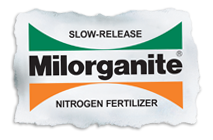Pink Snow Mold

North (only)
Grass species affected
Disease occurrence
- Late-fall through early-spring
- Pink snow mold doesn’t require prolonged snow cover, although snow, as well as cool, wet conditions, may enhance its development.
Symptoms
- Circular, pale-yellowish to reddish patches that may become white to pale-pink, typically seen with a pink outer ring.
- Grass has a matted appearance.
- In ideal conditions, you’ll notice a thin, fluffy covering of fungi that looks like stretched-out cotton covering the patch.
- Generally, infected areas are a little slower to green up.
Management
- Avoid excess application of nitrogen in the fall. A slow-release, low-nitrogen fertilizer, such as Milorganite, should be used for dormant fertilization.
- Rake up leaves in fall.
- Distribute large piles of snow to encourage rapid melting.
- Gently rake the affected areas to promote drying.
- Regularly dethatch your lawn.

